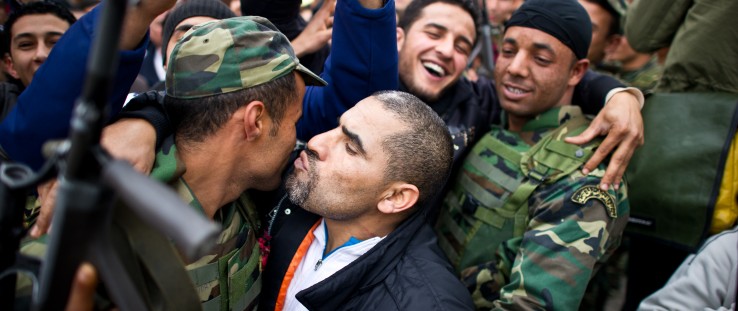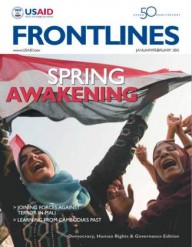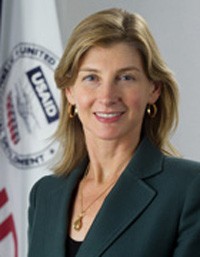 Tunisian protesters kiss soldiers during a demonstration against the presence of the toppled ruling party in the transitional government, Jan. 20, 2011, in Tunis.
Martin Bureau, AFP
Tunisian protesters kiss soldiers during a demonstration against the presence of the toppled ruling party in the transitional government, Jan. 20, 2011, in Tunis.
Martin Bureau, AFP
 Tunisian protesters kiss soldiers during a demonstration against the presence of the toppled ruling party in the transitional government, Jan. 20, 2011, in Tunis.
Martin Bureau, AFP
Tunisian protesters kiss soldiers during a demonstration against the presence of the toppled ruling party in the transitional government, Jan. 20, 2011, in Tunis.
Martin Bureau, AFP
During the past year, the momentous uprisings of the Arab Spring have both transformed the political landscape of the Middle East and North Africa and inspired activists far beyond that region to speak out for their fundamental human rights. Ordinary people around the world have acted with extraordinary selflessness and courage, inspiring us all.
The events in the Arab world and beyond demonstrate anew that true stability derives from legitimate, effective governments that are responsive to the needs of their people.
At USAID, we believe that democratic governance and human rights are critical for sustainable development and lasting peace in a society. To ensure we are supporting the creation of more legitimate and inclusive governance based on the full participation of civil society and the private sector, we are elevating and reconfiguring our efforts to advance democracy, human rights, and governance (DRG). In doing so, we will strengthen our support for free and fair elections, independent media and civil society, sound governance, and the uniform application of the rule of law.
As the assistant administrator of USAID’s Bureau for Democracy, Conflict, and Humanitarian Assistance (DCHA), I am proud to announce the establishment of our new Center of Excellence on Democracy, Human Rights, and Governance.
The Center will serve as a model for USAID’s transformation into an evidence-based learning organization, devoted to advancing best practices in the DRG field. The Center will place learning at the heart of its work—working closely with missions to systematically generate knowledge of what works (and what does not) in supporting DRG globally.
In establishing the Center, we are not only responding to current opportunities in the Arab world and beyond, but also to key policy initiatives of the Obama administration. Just over a year ago, Secretary of State Hillary Rodham Clinton and USAID Administrator Rajiv Shah released the first-ever Quadrennial Diplomacy and Development Review, tasking USAID to elevate its work in DRG.
The Center will propel the core agenda of USAID Forward by creating and applying an evidence-based approach through our global partnerships, our cutting-edge innovation, and our relentless focus on what drives results.
The DRG Center is located in the DCHA Bureau, linked to a powerful set of programs dedicated to the proposition that we cannot move from conflict to peace, fragility to strength, disaster to recovery, and ultimately from poverty to prosperity without inclusive, effective democratic institutions. The issues of authoritarianism, poor governance, disasters, conflict, and poverty are inextricably linked.
The 2011 World Development Report concluded that countries weak in government effectiveness, rule of law, and control of corruption have a 30 percent to 45 percent higher risk of civil war and significantly higher risk of extreme criminal violence than other developing countries.
Recognizing that broad-based inclusive development is crucial for the achievement of lasting democracy and peace, the Center will ensure that human rights and gender equality are integrated throughout all of USAID’s work. We will continue to address the needs of marginalized populations such as survivors of torture and war and people with disabilities. We will step up efforts to combat human trafficking, especially in conflict zones. We will promote labor and LGBT (lesbian, gay, bisexual, and transgender) rights, and increase support for human-rights defenders and human-rights commissions. We will work to prevent atrocities and secure transitional justice for all.
To further advance women’s rights in countries transitioning from conflict, the Center will launch a new Global Women’s Leadership Fund designed to support the inclusion of women in high-level decision-making processes and to identify entry points for their participation in peace negotiations and political transitions. By working closely with women at the local, national, and international level, we can help to ensure that they are present when decisions are made that affect their lives.
Our new Center of Excellence comes at a time of historic change and opportunity. Speaking in May 2011, President Barack Obama captured this moment: “We have the chance to show that America values the dignity of the street vendor in Tunisia more than the raw power of the dictator. There must be no doubt that the United States of America welcomes change that advances self-determination and opportunity.”










Comment
Make a general inquiry or suggest an improvement.